Brace yourself for epic baby animal cuteness at Walt Disney World.
For her first time ever, an adorable new addition bounded onto the savanna at Disney’s Animal Kingdom at Walt Disney World. At just two months old, African elephant calf Corra made her public debut on Feb. 16, taking her first steps into the limelight.
Corra’s debut marks a major milestone not just for the 312-pound bundle of energy, but for the theme park’s animal care team and global efforts to support the beloved endangered species. The event was captured in an Instagram video.
View this post on Instagram
MORE: Disney announces opening of Tiana’s Bayou Adventure
Corra was born to first-time mom Nadirah, who has lived at Disney’s Animal Kingdom since her own birth in 2005. This makes Corra the first second-generation elephant born at the park. Corra’s grandmother, Donna, and her aunts, Stella and Luna, are also part of the herd living together at the park.
“This is three generations of elephants,” said Dr. Scott Terrell, director of Animal and Science Operations. “So we’re super proud that we’ve recreated this matriarchal society here at Disney’s Animal Kingdom and our elephants are thriving.”
It Takes a Herd
The animal care team at Disney’s Animal Kingdom goes to great lengths to mimic the same conditions and interactions animals would experience in the wild. Female elephants stick together in a group and care for the herd’s young, while adult male and female elephants typically only interact to mate.
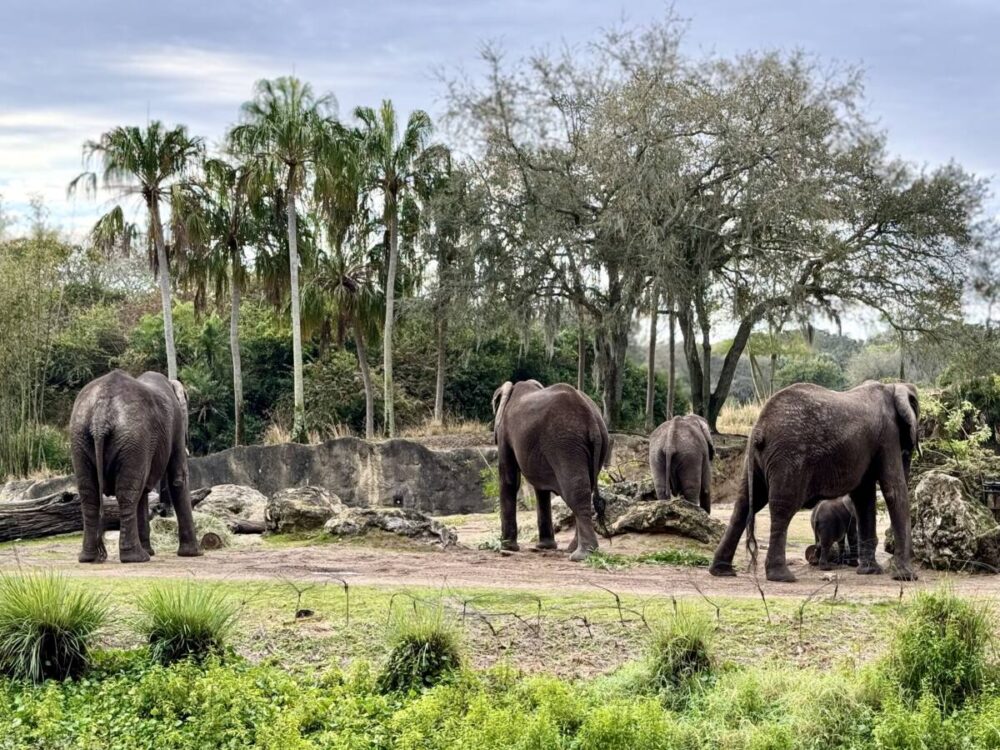
MORE: Loveable baby two-toed sloth is born at zoo
Elizabeth Warncke, animal care manager with Disney’s Animals, Science and Environment, who has been a key caretaker of Animal Kingdom’s elephants for 10 years, described how the park’s female elephants have established the same type of support system seen in the wild.
“It’s such an enriching thing that is so natural for them,” Warncke said. “They spend pretty much their entire lives with their mom, their grandmother, their aunts, their cousins. This is the dynamic that you would see in the wild so for us to incorporate it here is great for them.”
Animal Kingdom’s adult female elephants, including two unrelated females that are also part of the herd, all look out for and protect the herd’s young. This behavior extends everywhere from the bathing pool where Corra’s mom and aunt positioned themselves to ensure she stayed in the shallow end, to reacting protectively even in situations that pose no real threat.
“They want to circle around the calf. They want to protect the baby, they want to be near mom,” Warncke said. “Things that aren’t even a danger — a bird flies by — ‘protect the baby!’”
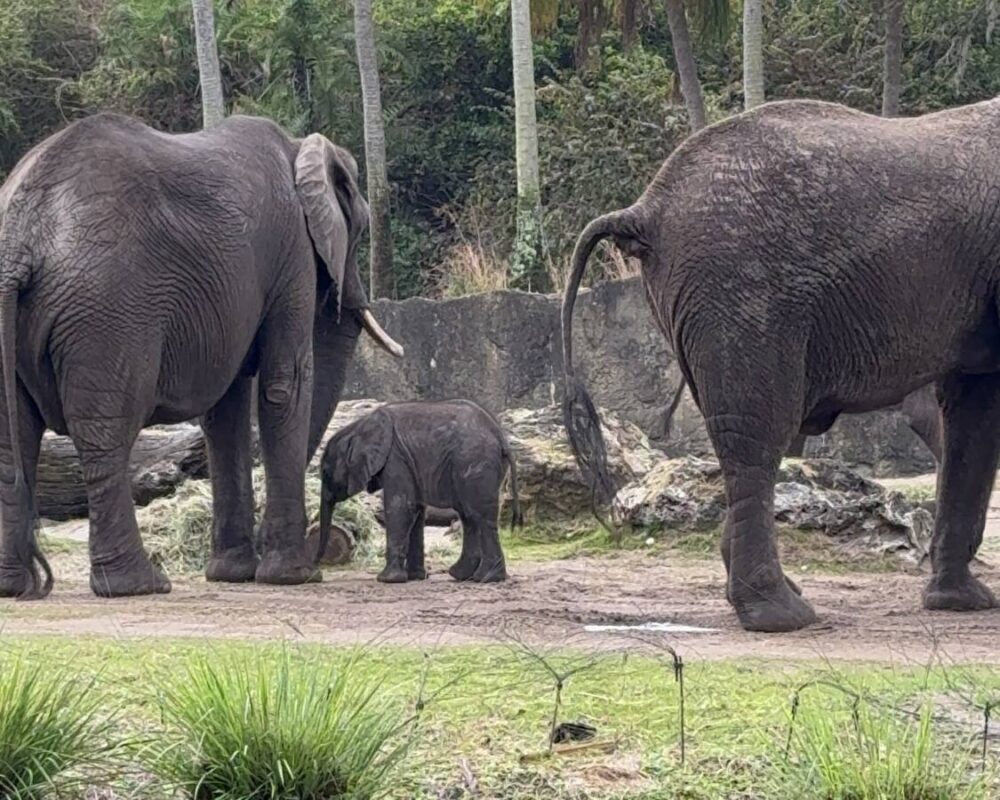
When elephant mom Nadirah went into labor, her younger sister Luna accompanied her as her main support system. Warncke explained that this not only gives Nadirah a supportive companion during the birth, but it also serves as a learning moment for Luna.
“We want to make sure that the younger elephants are involved … so that eventually, if Luna were to ever have a calf, she’s seen it. She’s been a part of the process. She understands what it is,” Warncke said.
As it turns out, this practice will indeed come in handy in the future. Terrell revealed that Luna is one of two elephants expecting in 2025.
A Team Effort
A team of experts that includes veterinarians, endocrinologists and other experienced members of the animal care team all play critical roles in ensuring the responsible and healthy breeding of endangered species at Disney’s Animal Kingdom, which is accredited by the Association of Zoos and Aquariums.
Endocrinologists monitored Nadirah’s cycles from the time she entered puberty, tracking their consistency and her physiological maturity, and the animal care team identified behavioral changes that also suggested Nadirah was ready for motherhood.
Testosterone levels and behavior are also monitored in the park’s male elephants, and Corra’s father, bull elephant Mac, was identified as a potential mate for Nadirah.
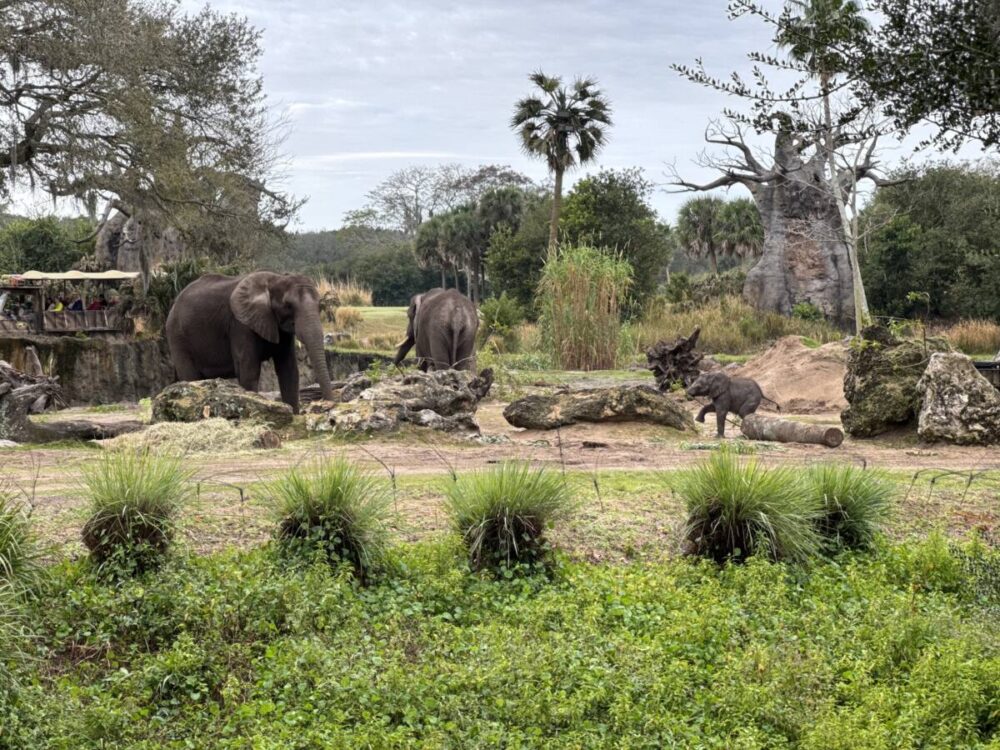
You can get an onscreen look at Nadirah and Mac’s “courtship” and hear more from their care team in season two of the National Geographic docu-series “Magic of Disney’s Animal Kingdom,” which takes viewers behind the scenes to showcase the animal care and conservation in action at Disney’s Animal Kingdom Theme Park, Disney’s Animal Kingdom Lodge and The Seas with Nemo and Friends at Epcot. Season two is currently streaming on Disney+.
22-Month Pregnancy, 15-Minute Delivery
Endocrinologists played an important role in monitoring Nadirah throughout her entire 22-month pregnancy — and helping her care team know when to be ready for the big day.
“We were looking at her reproductive hormone levels from the time that she conceived all the way to the time that she gave birth, so that was 639 days of a gestation period,” said Samantha Shablin, endocrinology research associate on Disney’s Animals, Science and Environment team.
“During the pregnancy, we monitor reproductive hormones to make sure that she is safe to make sure that the baby is safe and to make sure that she is hitting all of the milestones that she should be.”
With a 22-month pregnancy also comes a lengthy range — up to 85 days — for an elephant’s potential delivery date. Luckily, thanks to hormone level monitoring, endocrinologists are able to narrow down the predicted date of birth to within 48 hours so the care team can be prepared.
Without this information, explained Dr. Geoff Pye, animal health director at Disney’s Animal Kingdom, once an elephant reaches the general birth window for all elephants, the team would have to be prepared for round-the-clock monitoring for what could be up to 85 days.
“Our endocrinologists here do an amazing job to give us that 48-hour birth window … they were perfectly correct,” Pye said. “Which means that we can really focus our efforts so you don’t then have super tired people because they’ve been waiting … like 24/7 monitoring and then everybody is just exhausted.”
Pye said Nadirah’s delivery of 218-pound Corra took less than 15 minutes on Dec. 13, immediately kicking off a critical 24-hour period when his team focuses on performing an exam and ensuring nursing is successfully established.
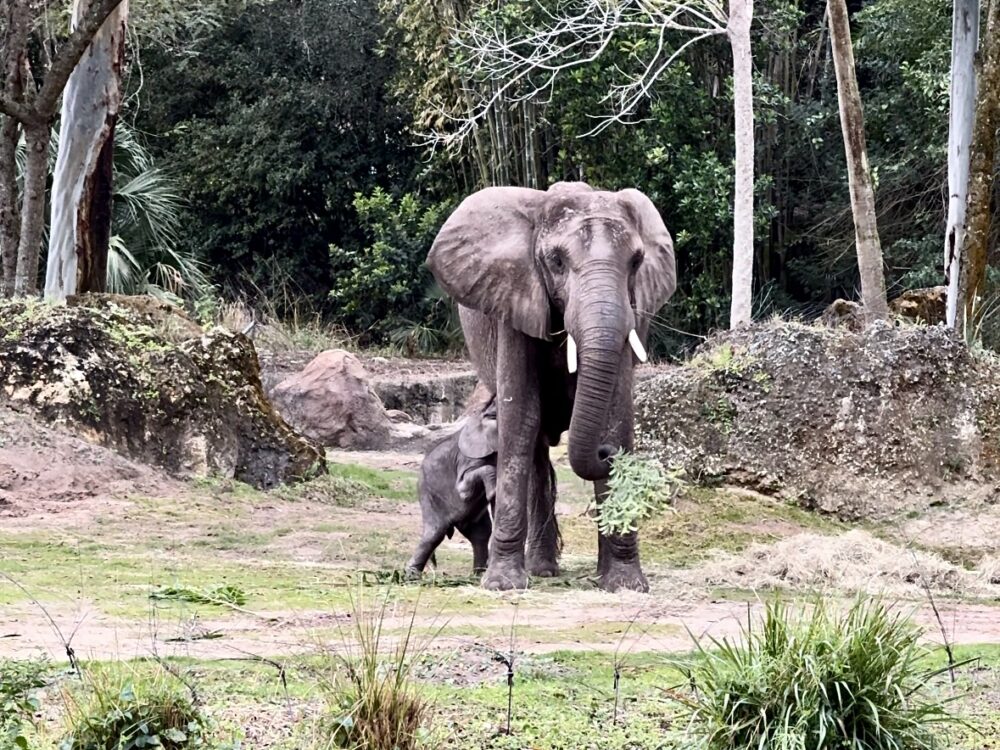
The impact of the animal care team throughout this 22-month process is undeniable, but what’s most impressive is how hands-off they manage to be — allowing the animals to take the lead and do what they instinctively do best. Pye shared a moving account of his observation of the moment of Corra’s birth, shared between mom Nadirah and her pregnant sister Luna.
“This is Nadirah’s first calf. Luna is in her first pregnancy and the look on their faces and their body language when Nadirah gave birth was just — it was amazing,” Pye said. “They were both like, ‘Oh my gosh, what has just happened?’ And when elephants are like that they trumpet. So the trunk comes out, and their ears are flapping and they back up and they’re just looking at Corra on the ground, and it was just a remarkable thing to see.”
Making an Impact for Elephants in the Wild
Corra’s birth marks yet another success for Disney’s Animal Kingdom and its participation in the African Elephant Species Survival Plan Program, overseen by AZA. Animal Kingdom’s participation in several SSPs has resulted in numerous other newborn additions, including giraffes, zebras, hippos and rhinos.
“This is an opportunity for zoos as a whole as well as Disney’s Animal Kingdom to tell the elephants’ story,” Terrell said. “Every elephant is our opportunity to continue to tell that story to really make a difference for elephants in the wild.”
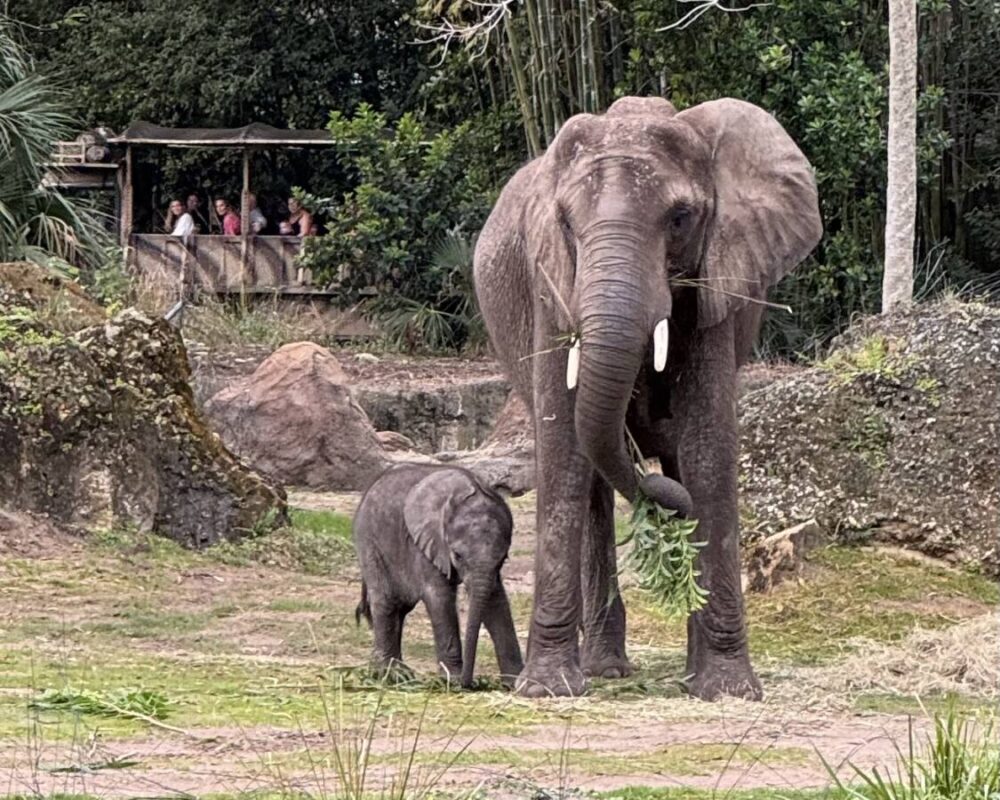
MORE:This adorable video shows a baby elephant practicing charges
Guests visiting Disney’s Animal Kingdom can see elephants along with more than 30 other species of animals on Kilimanjaro Safaris, an 18-minute “safari” that takes visitors in an open-air vehicle across the 110-acre Harambe Wildlife Preserve. The 60-minute, $39-per-person Caring for Giants experience gives guests an even closer look at the park’s breathtaking (and adorable) elephants.
Watch this baby elephant take her first steps on the savanna at Disney’s Animal Kingdom originally appeared on Simplemost.com


